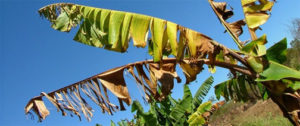
Fusarium wilt of bananas, commonly known as Panama disease, is a destructive soil borne fungus that poses a threat to the production of all banana and plantain crops. Fusarium Wilt Tropical Race 4 has reappeared and is now a priority pest threatening the region’s banana industry with serious economic, livelihood and food security repercussions.
There are four races of the fungus Fusarium oxysporum: Race one spreads globally in the first half of the 20th century destroying the Gros Michel Banana, which dominated world trade and also other banana varieties, but not the Cavendish variety; Race two affects cooking banana species such as Bluggoe; Race three infects only Heliconia species and not bananas; and Race four, the lethal fungal disease, not only affects most varieties of bananas and plantain but also the Cavendish on which over 90% of world trade is based.
The fungus enters the plant through the roots and destroys the xylem vessels (vessels responsible for the movement of water and nutrients to the plant). As it progresses, the first external symptom of the disease is the irregular yellowing of the margins of older leaves followed by the collapse of the leaves along the leaf stalk and stem resulting in a skirt of dead leaves around the lower part of the plant, splitting of the pseudo stem at the base of the plant and eventual plant death.
Internal symptoms of the disease of the pseudo stem include a brownish discoloration of the inner tissue. The easiest way to observe these symptoms is to cut through the pseudo stem near ground level. The discoloration is usually seen as reddish brown or black lines running up and down the pseudo stem, or rings running around the cross section of tissue. Affected plants rarely produce marketable bunches.
Chemical control is not a possible option at this time given that the fungus, once established in soil, remains active and persistent for an indefinite time period.
As a travelling public you should declare all agricultural items and should not carry any soil or agricultural propagative or planting material without the required quarantine approval and import permits. Also you should report any suspected signs and symptoms consistent with the Fusarium Wilt to your Ministry or Department of Agriculture and follow all prevention and control recommendations.
The regional bodies within the Caribbean Plant Health Directors Forum (which include representatives of regional and international organisations, government entities, universities and laboratories of the OECS, FAO, IICA, CIRAD, CARDI, CABI, UWI, UTT, UFL, USDA/APHIS, CARICOM) have been working collaboratively to reinforce surveillance and quarantine procedures to reduce risks of entry and establishment of the Fusarium TR4.


